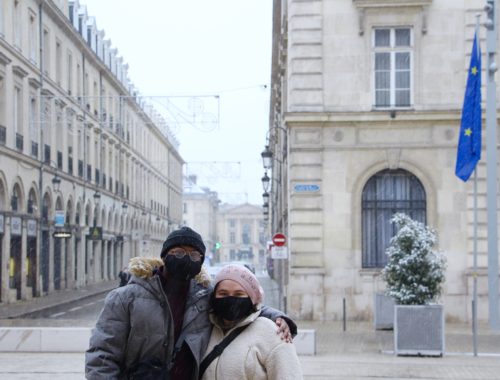
Applying for a Master’s Degree in France: Accepting an Offer
Note: This information is accurate as of December 2nd, 2020.
The final step of the Campus France process has finally arrived once you have decided to accept an offer of admission! Although straightforward in nature, this last part of the application can be quite nerve wracking and, quite frankly, surreal.
“Applying for a Master’s Degree in France” is a series of articles aimed at helping foreign students, especially Americans, apply to master’s programs in France by providing the information they need all in one place. In today’s article, we will be telling you how to accept an offer from a program.
Once you have found your programs, gathered your documentation, filled out the application, had your Campus France Interview, and waited for your responses, it’s time to make a decision on where you want to pursue your degree.
This step in the process is relatively painless and does not require a lot of paperwork or lengthy preparation. Now that you have been accepted to a university, you need to log into the Études en France platform and go to the “Students already accepted” portion of the website.
Start by clicking Step 1, Finalize the procedure. Under this section, you will follow all of the prompts to add your desired program, specify your academic situation, and verify your personal information. Once you have done these things, you must click on Confirm the information and submit the application. You will have a final opportunity to make sure everything is correct before submitting your decision by clicking on I confirm my final choice to Campus France USA. Congratulations! You have now chosen your program and your file is under review.
Campus France reviews your file in order to provide you with some paper work that will be essential for your visa procedures. This includes a confirmation email stating that your file has been reviewed and that you are now ready to apply for a visa as well as an acceptance/pre-enrollment letter. However, the time that it takes Campus France to review your file and give you the necessary paper work can vary tremendously from person to person. Maria and I were provided with the notification that our files had been reviewed as well as the paperwork immediately after submission, but this process can take up to three weeks. Once you do receive both the email and the pre-enrollment letter, you have completed all of your obligations with Campus France and are ready to move on to getting your visa!
We hope that you have enjoyed reading through our “Applying to a Master’s Degree in France” series and that this last installment has helped you wrap up the application process. Check out our other articles in the series that you may have missed, and leave us a comment if you have any questions.
Check out the other articles in our Applying to a Master’s Degree in France series:
- How to Choose a Program
- Important Documents You Need
- How to Complete the Online Application
- Detailed Application Timeline
- Campus France Phone Interview
- Will You be Accepted to a Program in France?
Check out our video about why you should study in France!
You May Also Like

Useful Blog Posts for International Students in France
November 9, 2022
Studying in France as Americans: Month Five, Exams, Classes, and Fun!
January 27, 2021


4 Comments
Avi
Hello Jalen and Maria! I just discovered your blog & YouTube channel as I’ve been doing research now that I’m hearing back from the applications I submitted to Masters programs in France. I wish I had discovered this earlier — you guys have been doing a really great job putting together very useful information!
I wanted to know if I could reach out to you guys via email. I was hoping to get more detail on what your experience was choosing which program to accept, dealing with the logistics of accepting an offer, what (if there even was one) student orientation was like, who/how to reach out to the specific school and program for more information your individual program, how to navigate a new city/culture, how much you study on your own vs in groups with other students, how engaged you are/how often you interact with other students outside of the classrom, what student activities people participate in, how you’re making new friends, and just what your experience is like in general!
Jalen & Maria
Hello, Avi! Thanks for watching and reading our content. We are glad that it’s been helpful for you. You can always reach out via email if you need to, however, we will try to answer your questions here as well.
Our experience choosing which program to accept was pretty painless. As we wanted to attend the same school and live together during our master’s studies, our choices were naturally narrowed down for us as we heard back from schools. In the end we had the choice between our chosen programs at Université de Lille and Université de Reims Champagne-Ardenne. We determined that living in and going to school in Reims was better for our particular situation and so we went! If you haven’t read our article on being accepted to programs, we’ll link it here.
Getting accepted: https://thefrancofile.net/applying-for-a-masters-degree-in-france-will-i-be-accepted/
In our experience, and especially because we began school in the thick of the pandemic, we did not have a new/international student orientation or welcome day. We have heard of schools, both public and private, holding events like this, so it may be something that picks up again more frequently as the world exits the pandemic. If you’d like to see how it was for us preparing for the beginning of our degrees here in France, check out our first few master’s degree in France update videos and their corresponding articles. We’ll link them here.
August/September video : https://www.youtube.com/watch?v=kfTZtQ_JrbU&t=103s
August/September article: https://thefrancofile.net/studying-in-france-as-americans-first-month-of-our-masters-degrees/
October video: https://www.youtube.com/watch?v=zowtEYG3pJE&t=3s
October article: https://thefrancofile.net/studying-in-france-as-americans-two-months-of-hard-work-into-our-masters-degrees/
November video: https://www.youtube.com/watch?v=3HsfHVC9UT8
November article: https://thefrancofile.net/studying-in-france-as-americans-month-three-lockdown-edition/
Our advice for reaching out to specific schools or programs would be to go to the program’s or school’s website, and contact the appropriate persons with the contact information that they provide to the public. It is usually an email or a phone number.
For navigating a new city/culture, that’s what our whole brand is about! Keep reading through our blog and watching our YouTube videos as navigating France is an ongoing process. Our biggest tips are to keep an open mind and to learn the language to the best of your ability.
Regarding relationships with other students, the pandemic has not created the most favorable conditions for hanging out outside of class, studying in groups, making new friends, or participating in student activities. For both of us, group studying and projects have been done through Zoom and Microsoft Teams. The ratio of individual study to group study will depend on the program and field of study one chooses. Maria had a lot less group work than Jalen, for example. Similarly, going out with classmates or other friends has been very limited as France was shutdown until very recently. We still had opportunities for this at the very beginning of the school year, though. As for making new friends, this was possible through in-person classes, group work, and class group chats. Lastly, student activities have often been held online rather than in person, and in our experience, they are not as frequently held or frequented as one might be used to in an American university. For more info on these aspects of our experience, check out our master’s degree playlist on YouTube as well as our Q&A video and our video explaining the differences between French and American university. We’ll link them here.
Masters degree playlist: https://youtube.com/playlist?list=PLgP2ppLLA4qcggECyOMStmT5lrN8yqN2D
Q&A video: https://youtu.be/5aonIppRo5U
Differences between French and American University: https://youtu.be/oJ_f4HzO47k
Keep in mind that we attend a public university in France and are doing programs that are fully taught in French. We do not attend a university or participate in a program that caters particularly in any way to foreign students, anglophones, or the like.
Our overall experience has been positive and we are so glad to be able to do what we are doing. It is a wonderful opportunity for anyone that has had a dream or desire to study, live, or work in France. That being said, it is not an easy experience. Doing this can be, and has been for us at times, very difficult intellectually and emotionally. We don’t hold anything back on our blog or YouTube channel, so for information concerning the general experience, follow, subscribe, and stick around for a while! We hope this comment was helpful and wish you the best of luck moving forward!
Avi
Thank you ! Et oui, J’ai bien compris que vous êtes tous les deux dans des formations qui sont dispensées qu’en français ! Mais j’ai encore quelques questions si ca ne vous dérange pas:
– Did your university help you find renter’s insurance, liability insurance, and health insurance? Did they help you with opening a bank account and in dealing with other logistics of moving as a foreigner?
– Would you say, in your experience (I’m sure this varies by professor and by program and by school), that your professors thus far have been responsive and that they encourage students to ask a lot of questions? Even just simple questions that have more to do with how classes/grades/other things work in France (as opposed to questions about actual course material) ? Are there a lot of opportunities to talk with professors outside of class (e.g. like office hours in the US) ? Are there Teaching Assistants ?
– Jalen- how did you go about looking for an internship ? Did your professors or the university help with your search ?
– What are the resources available if you are having a lot of difficulty understanding a particular topic or following a particular course ?
– I understand that COVID made it difficult to to build relationships with other students, and actually this is a concern that I have. I will not be moving with a significant other, so do you have advice for how to go about meeting new people, and becoming friends with other students and locals ? Do other students hang out around campus or the library or do people tend to just study at home and only frequent campus when there is a lecture ?
Jalen & Maria
Hello again, Avi.
We opened bank accounts during our time with TAPIF and got our renter’s insurance through the institution that we bank with. Foreign students are covered by basic healthcare provided by the state called “la sécurité sociale.” Our university did not help us to look for a supplemental health insurance coverage called “une mutuelle.” Our university put together a “guichet unique” where students could come to pay their fees, register, learn about housing options, etc. It is at this “guichet unique” that we were able to pay for and sign up for our liability insurance policies. These policies were necessary for our university registration. The university did not help us to find an apartment or anything of the sort.
In my experience, professors encourage questions often when it concerns the course material. Maria’s experience is different. Her professors do not often, if ever, ask for or encourage questions concerning the course material. No professor we’ve had thus far has encouraged us to ask questions concerning how things work in France. As the programs are mainly meant or French students, professors and educators assume that their students know how classes, grades, and other things work already. None of our professors have ever held office hours or encouraged students to discuss anything with them outside of class hours. We have not experienced being taught by teaching assistants, however, for some classes, Maria has had doctoral candidates as teachers while I have sometimes had professionals as teachers.
In order to find an internship, I made a CV and a cover letter and sent them to businesses that I was interested in. The university did not help me in my search for an internship. They told me by what date I needed to find one and where to find the forms that needed to be filled out once I found one. For techniques on how to find an internship, I did my own research online and asked classmates how they had gone about it in the past. My program’s secretary sent us a list of companies that had taken students from our program as interns in the past and my program manager sent us job announcements whenever companies contacted the program looking for interns.
If you are having difficulty understanding a particular topic or following a particular course, from our experience, you can ask your professor questions during class, you can go to the library and check out a book on the topic, you can look up the information you need online, you can ask your classmates for help, or you can attend tutoring sessions if your university offers something like that.
Being here together did not stop us in any way from meeting new people, nor did it reduce our desire to do so. Our advice would be to talk to people in your classes, join a group chat with your classmates, and say yes when there’s an invite to hangouts/outings. In our experience, French people are pretty curious and intrigued by you being a foreigner. It can play in your favor, especially if you speak French well. Students don’t really hang out around campus unless there’s a reason to be there, which is usually an academic reason. However, many students take advantage of the library for studying, including us. Most of the time, we study at home, though.
Again, these are our experiences, not necessarily those of other foreign students in France. We go to a public university and are both in programs geared towards the average French person. Foreign students attending more expensive, private schools, for example, may have different experiences. These schools and programs often cater to the multitude of specific discomforts that foreign students tend to feel when coming to study in France.
We hope this helps, good luck!